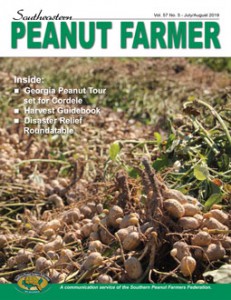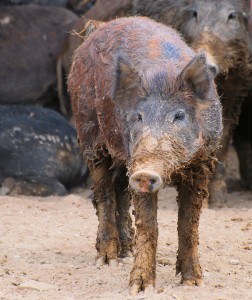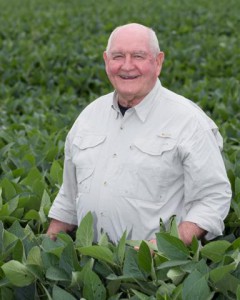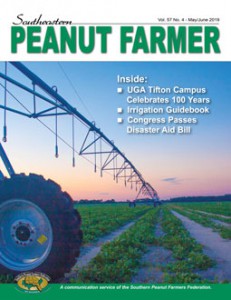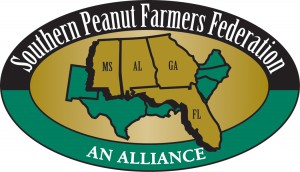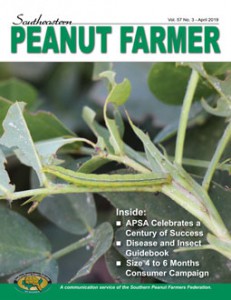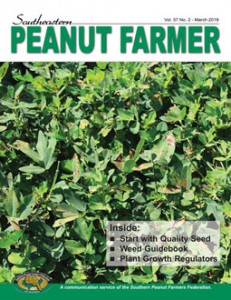
University of Georgia College of Agricultural and Environmental Sciences Dean Sam Pardue, left, presented Frank McGill with the Medallion of Honor during a special event on Thursday, May 2, on the UGA Tifton campus.
Frank McGill, 92, affectionally known throughout the Georgia agricultural community as “Mr. Peanut,” received the University of Georgia College of Agricultural and Environmental Sciences’ Medallion of Honor during a private event on Thursday, May 2, on the UGA Tifton campus.
The Medallion of Honor is presented to an outstanding individual or couple in recognition of dedication to the college’s mission and to express gratitude for the time, advice, support and influence they have provided.
“Once in a generation, someone comes along who forever changes a segment of agriculture. When it comes to peanuts, Frank McGill is that person. Scientists, farmers and even former U.S. President Jimmy Carter will tell you, without hesitation, that Frank McGill was extremely instrumental in developing the peanut industry in Georgia,” said CAES Dean Sam Pardue, who presented McGill with the award. “His wise counsel, steady advice and dedication to teaching the latest principles and production practices helped triple Georgia peanut yields, changing the economic future of southwest Georgia, which now produces nearly half of the nation’s total peanut crop.”
A native of Chula, Georgia, McGill earned a bachelor’s degree in agronomy in 1951 and a master’s degree in agronomy in 1962 from CAES.
He began his career with UGA as a county agent in southwest Georgia and later became the state’s UGA Cooperative Extension peanut specialist. McGill, who worked at the Coastal Plain Experiment Station in Tifton, Georgia, was a member of the UGA Cooperative Extension peanut team that developed a “package approach” for peanut production in Georgia. From 1954 to 1982, McGill’s expertise helped Georgia’s peanut yields increase from 955 pounds per acre in 1955 to 2,040 pounds in 1967 and 3,220 pounds in 1974.
Over his career, McGill traveled to 21 countries as a peanut consultant. He traveled to Australia and India to review research and extension programs and to Honduras, Suriname and Barbados to “jump start” local peanut production and to help eliminate pellagra, a protein deficiency that was affecting children there.
McGill served as a technical advisor to the Georgia Peanut Commission, U.S. Senate Agriculture Committee, National Peanut Council and the National Peanut Growers Group.
His honors include being named president of the American Peanut Research and Education Society and chairman of a special task force requested by the U.S. Senate Agriculture Committee to determine the 40-year impact of peanut policy on the family farm. UGA named him a D.W. Brooks Distinguished Professor of Agronomy and Progressive Farmer magazine named him Man of the Year.
He was inducted into the Georgia Peanut Hall of Fame in 1982 and received the Lifetime Achievement Award from the American Peanut Council in 1999. The Council also officially named McGill “Mr. Peanut” that year. In 1996, he was inducted into the Georgia Agricultural Hall of Fame and received the American/World Agriculture Award from the National County Agents Association in 2000. Last year, he received the Valor Award from the Southern Peanut Farmers Federation.
Of his numerous accolades, a humble McGill said, “I just did what I was hired to do.”
At his retirement in 1982, McGill discouraged gifts and the numerous monetary donations he received were used to create the J. Frank McGill “Up with Peanuts” Scholarship. As a result, a$2,000 scholarship has since been awarded each year to a rising junior or senior UGA crop and soil sciences major.
After retirement, McGill remained an active voice in the peanut industry. He served as president of the American Peanut Research and Education Society, chairman of the U.S. Task Force on Peanut Policy and the U.S. Peanut Improvement Working Group. He also worked as a peanut consultant with M&M Mars for 16 years, followed by four years as a part-time consultant with the National Peanut Laboratory.
McGill was selected as one of 12 UGA scientists whose work has impacted the world in the last 100 years as part of UGA’s centennial celebrations. And, in October 2018, he was honored by the UGA Graduate School as an Alumnus of Distinction.
“Frank is a phenomenal individual. I believe he is part of the reason the industry is as strong as it is, and production is as great as it is,” said Joe West, assistant dean of the UGA Tifton campus. West and UGA-Tifton honored McGill as one of 12 scientists whose work has impacted the world during a special ceremony in Tifton, Georgia in 2015.
“I think he is an excellent example of what a faculty member at the University of Georgia College of Agricultural and Environmental Sciences can aspire to for a career of service,” West said.
By Clint Thompson, University of Georgia College of Agricultural and Environmental Sciences

